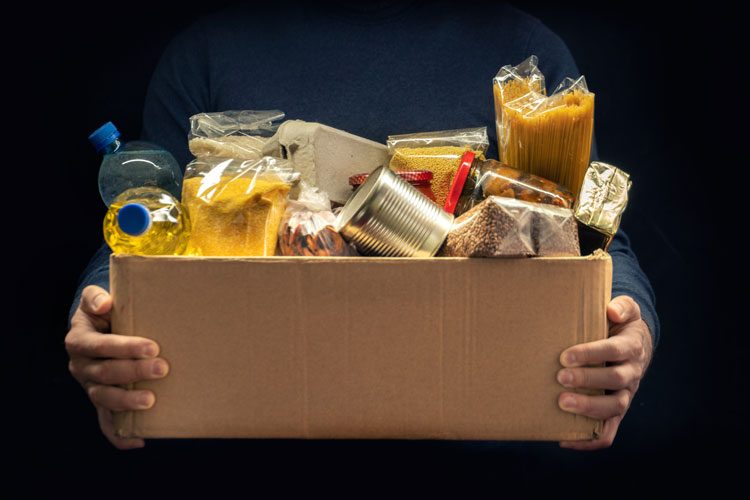Judicial protection for food assistance programmes
- Like
- Digg
- Del
- Tumblr
- VKontakte
- Buffer
- Love This
- Odnoklassniki
- Meneame
- Blogger
- Amazon
- Yahoo Mail
- Gmail
- AOL
- Newsvine
- HackerNews
- Evernote
- MySpace
- Mail.ru
- Viadeo
- Line
- Comments
- Yummly
- SMS
- Viber
- Telegram
- Subscribe
- Skype
- Facebook Messenger
- Kakao
- LiveJournal
- Yammer
- Edgar
- Fintel
- Mix
- Instapaper
- Copy Link
Posted: 4 November 2020 | Kelly Jackson (Nationwide Food Law Group) | No comments yet
As the COVID-19 pandemic continues to spread, Kelly Jackson from the Nationwide Food Law Group explains that federal food assistance programmes are receiving judicial protection from administration cuts.


On Sunday, 18 October, 2020, a federal judge struck down the current administration’s attempt to end food stamp benefits for nearly 700,000 unemployed adults. The decision was the result of a lawsuit filed by a coalition of 19 states, the District of Columbia, New York City, and numerous private advocacy groups against the US Department of Agriculture (USDA). This coalition came together to stop the enforcement of a new regulation, announced in December 2019, which would have eliminated states’ discretion to waive work requirements as a condition to qualifying for food stamps through the Supplemental Nutrition Assistance Program (SNAP).
According to the complaint: The Rule contravenes the federal statute it purports to enforce and arbitrarily reverses a decades-old policy that gave States discretion to seek waivers from the work requirements of the [SNAP program], 7 U.S.C. §§ 2011– 2036(c); 7 C.F.R. §§ 271–285, for areas within each State that lacked sufficient jobs for benefits recipients. The statute and the USDA’s prior regulations recognise that States are in the best position to evaluate local economic circumstances and to determine where there are insufficient job opportunities such that work requirements would be ineffective. The new Rule eliminates State discretion and criteria regarding local economic conditions for waiving work requirements, resulting in the termination of essential food assistance for benefits recipients who live in areas with insufficient jobs
In her ruling on 18 October, US District Court Chief, Judge Beryl Howell, wrote that implementing the new regulation “radically and abruptly alters decades of regulatory practice,” further noting its potential to “increase food insecurity for tens of thousands of Americans”.
This decision represents a victory for the war against food insecurity in America; however, as the USDA continues to pursue the implementation of other restricting regulations, that war is far from over.
Background
The COVID-19 pandemic has caused a rise in the food insecurity crisis in every state in America. This crisis existed before the pandemic; however, its impacts are worsening the situation, with a particularly disparate effect on children and seniors. A recent study by Columbia University researchers found that as of May 2020, more than eight million Americans have fallen into poverty. Yet, the current administration has attempted, both before and during the Covid pandemic, to cut programmes aimed at mitigating the food insecurity crisis. In particular, this effort has been targeted at the SNAP, which has paved the way for alleviating food insecurity and poverty.
As part of the USDA’s goals of increasing food security and reducing hunger, its budget dedicates 65 percent of its resources to the Food and Nutrition Service, which includes both the SNAP programme and the Special Supplemental Nutrition Program for Women, Infants, and Children (WIC). Perhaps the most paramount though is the SNAP. This programme is administered by the USDA along with states’ social service agencies, with the goal of “‘alleviat[ing] hunger and malnutrition by ‘permit[ing] low-income households to obtain a more nutritious diet through normal channels of trade.’” This goal is accomplished through the issuance of monthly benefits, colloquially known as “food stamps,” to eligible recipients.
SNAP is one of the country’s largest programmes for combatting hunger. In 2018 alone, the SNAP helped to keep more than three million Americans above the supplemental poverty line. Because the monthly payments are based on eligibility criteria, SNAP has also been responsive to economic downturns, serving as a primary counter-cyclical government assistance programme. This means that during an economic downturn, SNAP provides more payments to eligible persons and during an economic expansion, SNAP provides less.
That said, when a greater number of people are receiving benefits, this results in expenditures of these benefits, which stimulates the economy. Furthermore, while the programme is intended to be expansive in order to provide a healthy diet based on household size, it is also intended to be implemented at minimal cost. Thus, although SNAP serves as a lifeline for millions, the benefits only grant $1.40 per person, per meal, which 80 percent of recipients will run out of halfway through the month.
In 2018 alone, the SNAP helped to keep more than three million Americans above the supplemental poverty line.
While instrumental, SNAP does not achieve its full potential at mitigating food insecurity and poverty. This is due in large part to efforts of those in government with concerns over the size and cost of the programme, who then create barriers for those eligible recipients wishing to receive benefits. For instance, for decades applicants have faced a complex application process for SNAP, which oftentimes discourages them from pursuing benefits. To the dismay of SNAP supporters, the current administration has continually tried cut the programme. This effort has continued throughout the COVID-19 pandemic, despite the fact that six million Americans applied for SNAP benefits from February to May of 2020.
Federal effort to restrict access to food assistance
Despite the very real issue of food insecurity across the country, the current administration has been working assiduously to cut food-related federal safety net programmes. In 2018, the USDA sought to reduce funding to key programmes in both the president’s proposed budget and the 2018 Farm Bill, which funds many programmes including SNAP. This act alone created waves, as the Farm Bill is traditionally a bipartisan legislative package.
In particular, the proposed changes to the Farm Bill would have increased administrative burdens on both applicants and administrators and reduced states’ ability to make eligibility determinations. The result of these changes would have been the ineligibility of millions for programmes such as SNAP. However, a group of bipartisan congressional lawmakers rejected the USDA’s proposals, ultimately – and almost resoundingly – passing a bill in a Republican majority House and Senate without these changes. This, in turn, prompted the USDA to exert its regulatory power.
Only days after the bill’s passage, the USDA introduced rule changes aimed to implement the very proposals rejected by Congress. Between December 2018 and December 2019, the USDA proposed the following three regulations:
- Able-bodied adults without dependents (ABAWDs)
- Broad-based categorical eligibility
- Standard utility allowance.
The ABAWD regulation would become the focal point of the lawsuit filed against the USDA.
Ordinarily, able-bodied adults between the ages of 18 and 49 without dependents can receive benefits for no more than three months during a three-year period, unless they are enrolled or working in an education or training programme for 80 hours a month. Notably, states have been able to waive this time limit to ensure access to food stamps; this power enables Americans to cope with the economic challenges associated with reentering the workforce. The new rule would have restricted states’ ability to apply waivers to those who could not report 20 hours of work per week. The recession brought by Covid, and thus, the inability of many to work the required 20 hours per week, would have made this rule all the more problematic.
Nonetheless, in the spring of 2020 the USDA prepared to finalise and implement the ABAWD rule. This occurred despite the tens of thousands of public comments opposing it. On 13 March 2020, US District Court Chief Judge Beryl Howell issued an injunction blocking the rule’s implementation and, ultimately, struck down the rule on 18 October 2020.
Litigating the ABAWD Regulation
In January 2020, a coalition of 19 states, the District of Columbia, New York City, and numerous private advocacy groups filed a lawsuit against the USDA, Civil Action No. 20-119 (BAH). This lawsuit argued that the ABAWD rule directly undermined Congress’ intent for SNAP, that the USDA violated the federal rule-making process, and that the rule would impose significant regulatory burdens on states, harming its economies and residents.


On 13 March 2020, Judge Howell issued an injunction blocking the rule. Absent court intervention, the rule would have taken full effect at the end of the state of emergency of Covid-19, declared by the president on the same day as the injunction. As part of the injunction, Judge Howell stated the rule was “capricious, arbitrary, and likely unlawful,” sentiments that would later be echoed in her 18 October ruling. Shortly after the injunction, the USDA signalled its intent to appeal the order.
However, in response to the declaration of a state of emergency, Congress waived the ABAWD requirement for the duration of the emergency. Further, in response to a public outcry against the intended tightening of the SNAP’s eligibility requirements, the administration agreed to suspend the new regulation’s planned April, 2020 implementation date. The district court’s injunction remained in place, awaiting a final ruling.
The final ruling occurred on 18 October 2020, whereby Judge Howell granted summary judgement in favour of the plaintiffs. In her strongly worded 67-page opinion, she condemned the USDA for failing to justify how the rule comported with both existing regulatory practice and with the COVID-19 pandemic. She stated that the rule “at issue in this litigation radically and abruptly alters decades of regulatory practice, leaving States scrambling and exponentially increasing food insecurity for tens of thousands of Americans,” and added that the USDA “has been icily silent about how many [adults] would have been denied SNAP benefits had the changes sought . . . been in effect while the pandemic rapidly spread across the country.” Ultimately, she concluded that the department’s “utter failure to address the issue renders the agency action arbitrary and capricious.”
There has been a wave of support in response to the ruling. Attorneys general from California, D.C., Maryland, New York, Virginia, among other states, praised the decision. They asserted that the regulation would have cut nearly $5.5 billion over five years from food stamp spending. This, they alleged, would have imposed drastic consequences on a one-size-fits-all basis without any evaluation of individual need. The decision was perhaps best summarised by New York Attorney General Letitia James, who stated that it was “a win for common sense and basic human decency”.
Conclusion
Although the ruling should be lauded as a great victory, the events leading to it, and the ramifications that could have occurred had the result been different, should not be forgotten. The current administration’s pursuit of the ABAWD rule, despite being in the midst of a pandemic, should serve as a stark warning that a political agenda can outweigh common sense and basic human decency.
Importantly, the two proposed rule changes that accompanied the ABAWD rule have not yet been finalised and pose a threat. These rules seek to cap deductions for utility allowances and limit poor, working families’ access to SNAP benefits. As the USDA continues to pursue these other regulations, it is important to remember that the war is far from over.
About the author
Kelly Jackson is a member of GrayRobinson’s Nationwide Alcohol Beverage & Food Law Department, focusing on the laws that govern the production, distribution and retail sale of alcohol beverages, foods and other regulated products. Ms Jackson is a recent graduate of Stetson Law School, where she served as Editor in Chief of the Stetson Law Review. She earned a B.S. in International Affairs from Florida State University. Kelly previously worked at the Public Defender’s Office 10th Judicial Circuit from January 2017 to August 2017, prior to commencing law school.
Related topics
Food Security, Health & Nutrition, Regulation & Legislation, The consumer







